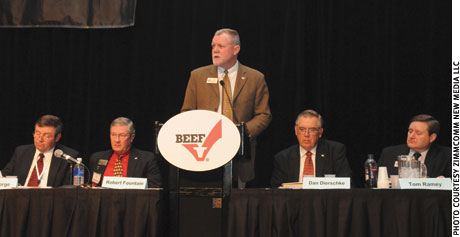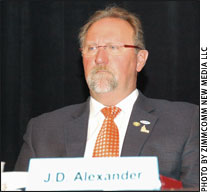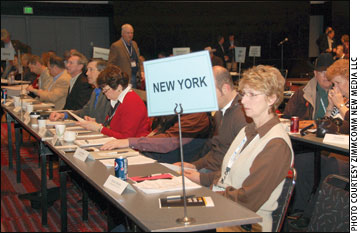Members Take Action in Final Session
Industry organizations elect officers, approve policy resolutions
directing staff as to policy positions.
by Troy Smith for Angus Productions Inc.
DENVER, Colo. (Feb. 5, 2011) — The 2011 Cattle Industry Convention in
Denver concluded Saturday with a joint meeting of the Cattlemen’s Beef Board (CBB) and the board of directors for the National Cattlemen’s Beef Association (NCBA), followed by the annual NCBA membership meeting. While in joint session, CBB and NCBA directors unanimously approved a new Long-Range Plan, which establishes the following core strategies and goals:
- Improve domestic consumer preference for beef, with a goal of increasing the Consumer Beef Index preference measure from 28% to 31%.
- Capitalize on global growth opportunities, with a goal of increasing value of U.S. beef exports by 25% per head.
- Strengthen the image of beef and the beef industry, with a goal of establishing a benchmark measure of public perceptions of beef and beef production.
- Protect and enhance freedom to operate, with a goal of developing an index to measure and track freedom to operate.
- Improve industry trust, openness and relationships, with a goal of establishing a benchmark of industry stakeholder perceptions of unity and trust.
- Position the U.S. cow herd for growth, with a goal of increasing bred heifer retention to 18% while stabilizing U.S. beef production at a minimum of 26 billion pounds (lb.) annually.
CBB directors seated Arkansas cattleman Tom Jones as chairman; Wesley Grau of New Mexico as vice chairman; and Weldon Wynn, also from Arkansas, as secretary-treasurer.
Advancing through the chairs of leadership were Montana rancher Bill Donald as president of NCBA and Nebraska cattle feeder J.D. Alexander as president-elect. Members elected Wyoming dairy and cow-calf operator Scott George as vice president. David Dick of Missouri was chosen to succeed George as chairman of the Federation of State Beef Councils (Federation Division) and Texan Bob McCan was named chairman of NCBA’s Policy Division.
“It is a great honor to be elected to lead NCBA for the next year. There is tremendous opportunity out there for U.S. cattlemen and women, and we plan to make every opportunity a reality,” Donald said. “We’re a diverse outfit. NCBA represents the entire industry — from packers to cow-calf producers and everyone in between — but to be profitable it takes all of us working on the same issues.”
Directors representing the Federation Division adopted a 12-point Charter of Principles, which clarifies its role within the NCBA framework as separate and distinct from that of the Policy Division, whose lobbying activities are funded through NCBA dues. The Charter affirmed the Federation’s ability to make decisions independently with regard to investment beef checkoff resources contributed by qualified state beef councils. The Charter also calls for the appointment of a senior executive officer for the Federation Division and a compliance officer.
Addressing policy
Several 2011 policy resolutions were approved, including policy on immigration, food safety, marketing, cattle health and federal lands.
The policies established are driven by grassroots cattlemen and women, said 2010 NCBA President Steve Foglesong, emphasizing that members decide the organization’s policy positions. “Our members chart the course for our organization and for the entire beef industry. This organization is producer-owned and member-driven,” said Foglesong.
Border security. NCBA members adopted a resolution related to border security and federal lands designations. The resolution supports authority for federal agencies as well as state and local authorities to secure the border with Mexico, and requests suspension of all pending legislation and funding for federal-land designations along the border.
The resolution states that federally owned lands along the border with certain designations such as “wilderness areas” provide unfettered access for illegal cross-border activities by restricting the motorized access of federal agents responsible for patrolling the land.
Eastern’s bankruptcy. In response to the Eastern Livestock Co. bankruptcy and resulting financial losses suffered by cattle producers and Eastern’s service providers, NCBA members directed staff to work aggressively with members of Congress and appropriate federal agencies to make funds available at low interest or no interest to assist producers and firms that were directly affected. Staffers will also work with the relevant congressional committees to seek a congressional oversight hearing into the Grain Inspection, Packers & Stockyards Administration’s (GIPSA’s) audits and bonding of all cattle auction markets and dealers.
Disease traceability. In other action, members approved a resolution calling for NCBA to be at the forefront of discussions on any animal disease traceability program requiring animal identification (ID). NCBA maintains that any associated costs to producers be minimized and paid through federal or state funds if possible.
Additionally, the resolution stipulated information relative to animal ID should remain under control of state animal health officials and be kept confidential and protected from disclosure. Furthermore, any such program must operate with the speed of commerce and producers must be protected from liability for acts of others after cattle are no longer under said producers’ control.
Cattle health. The membership called for NCBA staff to urge the U.S. Department of Agriculture (USDA) and Congress to provide full funding for purposes of indemnification for brucellosis, tuberculosis, foot-and-mouth disease (FMD) and emergency diseases.
Another resolution recognized the role that pooled Polymerase Chain Reaction (PCR) testing plays in the control of the reproductive cattle disease trichmoniasis and called for further education and research of pooled PCR testing for the beef industry.
Food safety. New policy was adopted in support of a collaborative and multidisciplinary approach to the identification and development of interventions along the entire food chain and that support research to determine critical virulence factors for non-O157 shiga-producing E. coli toxins.
Additionally, NCBA continues to support collaborative food safety research to make beef an even safer product.
Members renewed existing policy opposing any legislation or regulations that limit methods for marketing cattle, including value-added systems or strategic alliances.
“This is the bread and butter of our organization. This is truly where the magic happens, so-to-speak,” said Colin Woodall, NCBA vice president of government affairs. “Our members take the time away from their operations and their families to travel here and debate important issues affecting the U.S. beef cattle industry. They then put it on paper. When we are fighting for U.S. cattlemen and women in Washington, D.C., we use these policy positions as our roadmap.”
###
Editor’s Note: The above article was written under contract or by staff of Angus Productions Inc. (API). It may not be reprinted without express permission of API. To request reprint permision, contact the editor at 816-383-5200.
www.4cattlemen.com is an event coverage site provided by the editorial team at Angus Productions Inc. (API), publisher of the Angus Journal, the Angus Beef Bulletin, the Angus Beef Bulletin EXTRA and the Angus e-List. For questions about this site, to submit an article for our consideration, or to report a broken link, contact the editor at 816-383-5200; 3201 Frederick Ave., Saint Joseph, MO 64506.
API claims copyright to this web site as presented. We welcome educational venues and cattlemen to link to this site as a service to their audience.




